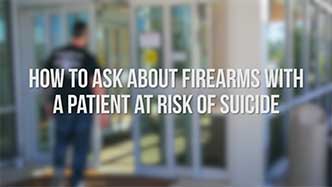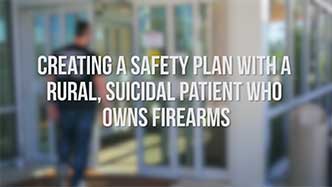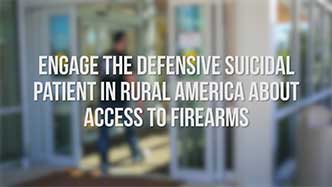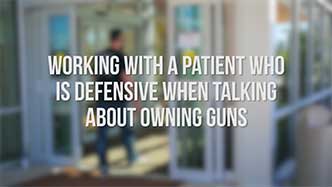Addressing Firearm Safety in Your Suicidal Patient Video Resources

41,000 PERSONS DIE by suicide annually in the United States
FIREARMS account for over 50% OF DEATHS BY SUICIDE
Links and Resources
The 4 videos featured on this page were developed as a training tool for primary care providers who work in rural settings with patients at risk of suicide. Data suggest that in rural America gun ownership is common. Having a conversation about temporarily removing firearms from easy access by someone who is at risk of suicide has great promise for saving lives.
The videos integrate research findings from a 2-year long research study designed to better understand rural firearm culture and messaging strategies that would increase the likelihood of a person at risk of suicide having a friend or family member temporarily hold their guns. The study included focus groups with rural firearm owners and key informant interviews with leaders in the gun community, all in Central Oregon. Additionally, over 800 firearm owners across the country were surveyed to further establish the efficacy of the project’s messaging.
Each video is designed to stand on its own. Introductory material is repeated, although in some instances this is changed slightly to better describe the patient in the context of the specific film. The videos center on what to ask and how to ask about firearms. They do not focus on addressing other methods of suicide. The skills demonstrated come directly from research findings.
These videos are designed for primary care providers to learn more about how to communicate with a patient at risk of suicide about firearm safety. It is not intended to be a complete course on screening for suicidal ideation, nor risk and lethality assessment, nor treatment. Providers are encouraged to seek additional training in these skills.
Members of an expert panel reviewed each video. Members of this panel include:
- Laura Pennavaria, MD, Chief Medical Officer, St. Charles Health System
- Danielle Baughman, B.S., Clinic Operations Manager, St. Charles Health System
- Cheryl Emerson, M.S. Mental Health Clinician, private practice
- Sierra Groenewald, MSW-C, Behavioral Health Consultant, Mosaic Medical
- Susan Keys, Ph.D. Retired Associate Professor of Public Health, OSU-Cascades and Project Consultant
- Kristi Nix, MD, physician High Lakes Health Care
- Scott Safford, Ph.D. Behavioral Health Consultant, St. Charles Health System
- Whitney Schumaker, MPH, Suicide Prevention Coordinator,
- Deschutes County Health Services
- Eileen White, President, NAMI of Central Oregon
If you would like support when speaking with a suicidal patient, call the Suicide & Crisis Lifeline at 988 for assistance.
For more information about suicide prevention and primary care pleases visit the Primary Care Suicide Prevention Toolkit.



